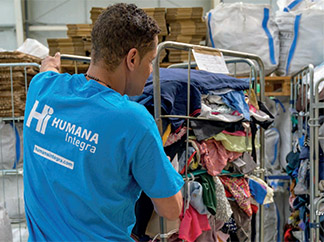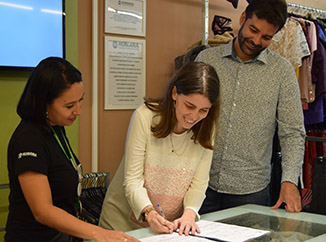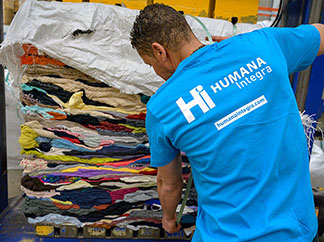consent_cookie
Duración: 1 year
Stores the user's cookie consent state
19-12-2019
Humana has generated 44 inclusive contracts in the last 20 months thanks to textile management. This management is, therefore, a valuable tool for the labor insertion of groups in vulnerable situations, which contributes to the empowerment of these people.
Selective collection, maintenance of containers, preparation for reuse and the tasks of second-hand clothing stores are the main areas through which Humana generates inclusive jobs: the management of used clothing has generated 44 hiring since the beginning of 2018 for people who were in a situation of vulnerability and derived from insertion services. “The professional and transparent management of textile waste constitutes an engine of social and solidarity economy. The reuse and recycling of clothing has a clear social impact", says Elisabeth Molnar, CEO of Humana, who adds:“ Networking between our team and that of our collaborators, individualized support to design itineraries for the occupation and continuous advice are the keys to our commitment to equal opportunities. ”
Humana integra, the Foundation's socio-labor insertion company
First, the Foundation complements its work in the field of textile waste management with that of Humana Integra, an insertion company that acts as a bridge between people with difficulties to access the ordinary labor market and potential job seekers. Since spring 2018, seven people have completed an individualized insertion and training itinerary.
Recently, Humana has been awarded the contract for the selective collection of textile waste in Córdoba. In compliance with the public contract, three people at risk of social exclusion (with more than 12 months unemployed) assigned to the service of the Andalusian city have joined the workforce.
Network of collaborators in the field of inclusion
The organization also collaborates with social entities and administrations so that there are more people with possibilities of joining the ordinary work environment.
“Labor inclusion is a success if the necessary supports are offered. Our activity generates employment and helps improve the living conditions of thousands of people, thanks to our development cooperation projects and also to local support actions, in Spain", explains Elisabeth Molnar.
The circular economy and job creation
The circular economy is a generator of green occupation in the field of waste management. Precisely the preparation for reuse, recycling of textile fibers and the energy recovery of clothes that cannot be used are the main features that make it possible to apply a circular economy model to the management of used textile. The Foundation has established itself as a leading agent of the social economy, the green economy and the circular economy: it generates resources, employment and wealth. Its workforce currently amounts to 650 people.


